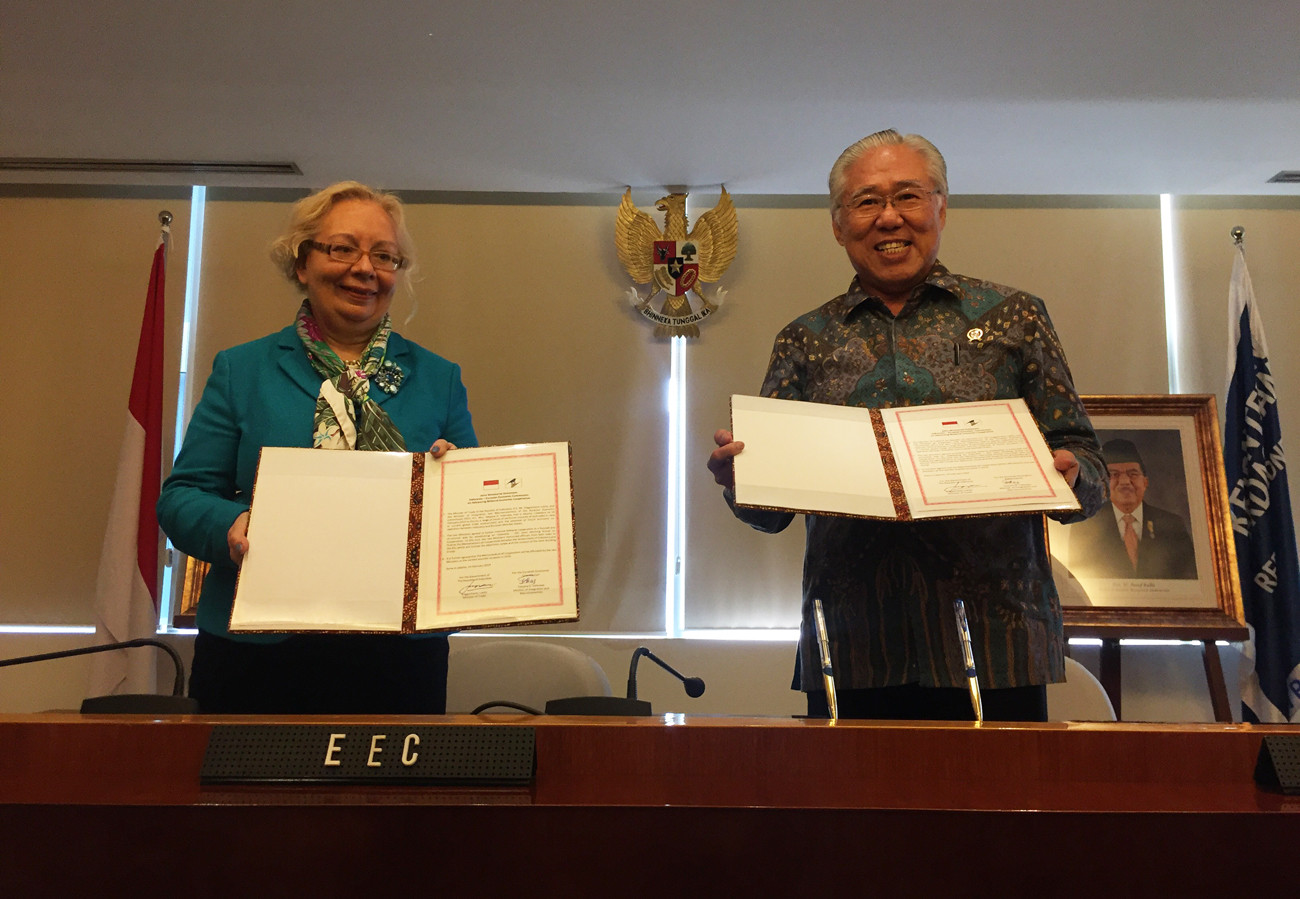Popular Reads
Top Results
Can't find what you're looking for?
View all search resultsPopular Reads
Top Results
Can't find what you're looking for?
View all search resultsRI eyes European market through trade talks with EEU
Change text size
Gift Premium Articles
to Anyone
I
ndonesia is striving to improve its access to the European market via three different arrangements with economic unions on the continent.
The latest development came last week when Trade Minister Enggartiasto Lukita signed a joint ministerial statement on trade with Tatyana Valovaya, the integration and macroeconomics minister of the Eurasian Economic Union (EEU).
In the ministerial statement, the two ministers expressed a commitment to sign a memorandum of cooperation (MoC) within the first half of this year to strengthen the bilateral relationship, Enggartiasto said.
“We plan to sign the MoC during one of the business forums we will hold this year […] either in Vladivostok or St. Petersburg [both in Russia] or at the upcoming Trade Expo Indonesia,” he said at the ministry’s office in Jakarta recently.
The members of EEU are Russia, Kazakhstan, Belarus, Armenia and Kyrgyzstan. Trade between the EEU and Indonesia totaled US$2.79 billion in 2017.
Through the MoC, Enggartiasto said this figure could double over the next five years.
The Trade Ministry said in a statement in January last year that discussions with the EEU were projected to result in a comprehensive economic partnership agreement (CEPA).
However, Enggartiasto said it would be difficult to reach a more detailed agreement as the deal would involve a union of five countries, hinting that any negotiations on a prospective CEPA would take a long time.
Valovaya lauded the joint-ministerial statement, saying the door remained open for the two sides to turn the upcoming MoC into a free trade agreement after both parties held more in-depth talks.
In the meantime, the MoC would help the EEU and Indonesia reduce trade barriers, she added.
“A lack of information about trade [between both parties] is one of the trade barriers between us [and Indonesia],” Valovaya said on the same occasion. “Hopefully, with this [signing] we will get to know more about Indonesia, and Indonesia about the union, as well as our regulations.”
Indonesia and the EEU first started trade talks in December 2017. Throughout 2017, Indonesia’s exports to EEU countries reached $1.25 billion, with crude palm oil, machinery and coffee being the main commodities.
Meanwhile, Indonesia’s imports from the EEU totaled $1.54 billion with the main commodities being half-finished steel products, fertilizer, wheat and aluminum.
“We agree that it is very fruitful to have this business forum as Indonesia is one of the key business partners for the EEU,” said Valovaya.
The recent joint statement with the EEU came after Indonesia signed a CEPA with the European Free Trade Association (EFTA) in December 2018. EFTA’s member countries are Switzerland, Liechtenstein, Norway and Iceland.
The Indonesia-EFTA CEPA ended eight years of arduous talks as ministers of both parties made a joint statement last November in Geneva, Switzerland. It is expected to boost the trade value between the two parties, which totaled $2.4 billion in 2017.
On the other hand, Indonesia continues to face difficulties concluding talks on a CEPA with the European Union, with negotiations ongoing since 2016. The government missed its target to conclude the negotiations by the end of 2018.
The Indonesia-EU CEPA would be Indonesia’s largest trade arrangement with European partners, as the EU includes the largest economies in the region.
According to Statistics Indonesia (BPS), the EU accounted for over 10 percent of Indonesia’s exports in 2018, totaling $17.03 billion. The EU also accounted for 8.86 percent, or $14.08 billion, of Indonesia’s imports.
Enggartiasto said last month that the Indonesia-EU CEPA is one of 12 trade arrangements the government targeted to conclude this year.
“The Indonesia-EU CEPA is not easy to talk through but we are working on it,” he said separately. “Crucial and more sensitive aspects like palm oil [...] are still being discussed, similar to what occurred during the Indonesia-EFTA CEPA negotiations.”










